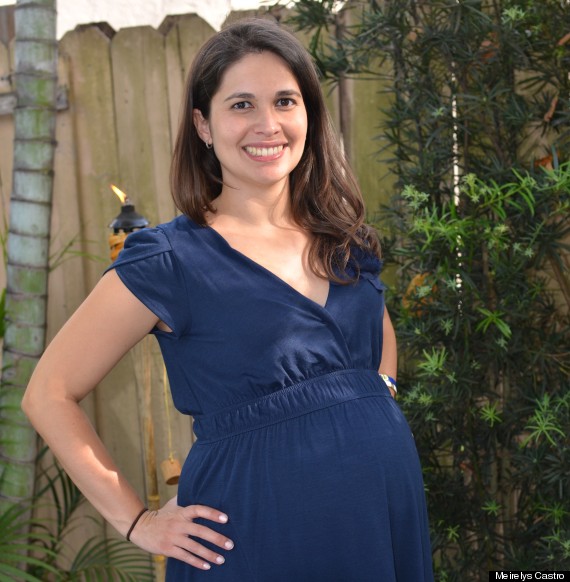Editor's Note: Lilyvania Mikulski, the Assistant Director of the Office of Media Relations at Florida International University, interviewed Idaykis Rodriguez, a Ph.D. candidate in Physics at the university about what it means to be a woman in science. Their correspondence is as follows:

Ida, currently 8 months pregnant (Photo credit: Meirelys Castro)
1. What interested you the most about physics? Why did you decide to pursue a career in it?
A passion for physics was instilled in me by my great high school physics professor David Jones. He takes all those bad connotations of physics- being difficult and boring- and turns them into intellectual challenges. His passion was infectious, and it encouraged students, me in particular, in pursuing difficult challenges and excelling in them. I decided to pursue a career in physics in order to educate the new generations of physics students with the hope of instilling the same passion in them as my high school teacher did to me.
2. What's been your biggest challenge pursuing a career in science?
The biggest challenge I have experienced in science was being part of the research community. It was an overwhelming feeling, being part of a conference and thinking that maybe I'm not good enough to do this, to be a part of it, to be like them... But after reflecting on my feelings of insecurity, I decided to stop perceiving myself as a small person in the research community and rather as a valuable participant in the research community. I was determined to grow and become an active member in physics, not only through research but also through mentoring and networking.
3. What's one thing you know now about a career in STEM that you wish you knew when you first started?
I wish I knew all the possibilities for jobs and careers that can stem (no pun intended) from a STEM degree. It is hard to think that physics as a career leads to anything other than becoming a professor or researcher. I have learned that physics and other STEM careers open a wide variety of job and career opportunities and people aren't making the connection to STEM degrees. It’s all a matter of how to market your abilities and skills. Yet, the skills acquired in science including critical thinking, skepticism, and evaluation based on supporting evidence are invaluable lessons for everyday living.
4. What's the most valuable trait you feel you need to succeed as a woman in science?
Defiance, determination, and a positive attitude. A woman in science, especially physics, needs to develop a way to defy all odds and make every obstacle a challenge, even if the obstacles are discriminatory people. A woman in physics needs to be determined to reach her goals. Work hard and find friends that believe she can do it the same way she supports that they can do it. And a woman in science needs to have the right attitude, a positive attitude, and believe that she will overcome all obstacles and achieve her goals. An attitude that is amiable, yet fierce to gain respect from peers and professors.
5. What in your opinion is the biggest reason why fewer girls enter science fields? And, how can we change that?
Research shows that girls do not develop a science identity. By the time they reach high school, girls are turned off to science and feel like it’s not a part of them or that they can't do it. In my opinion, this happens because of society’s general view of science as being difficult and math driven, a field where most role models are men. Girls need to be encouraged to pursue their interest in science. Teachers are in a great position to provide this encouragement, but much of the influence on girls also comes from home and the media. If society as a whole is not educated on the opportunities that science offers to girls, then it will be difficult to change the outlook for women in STEM.